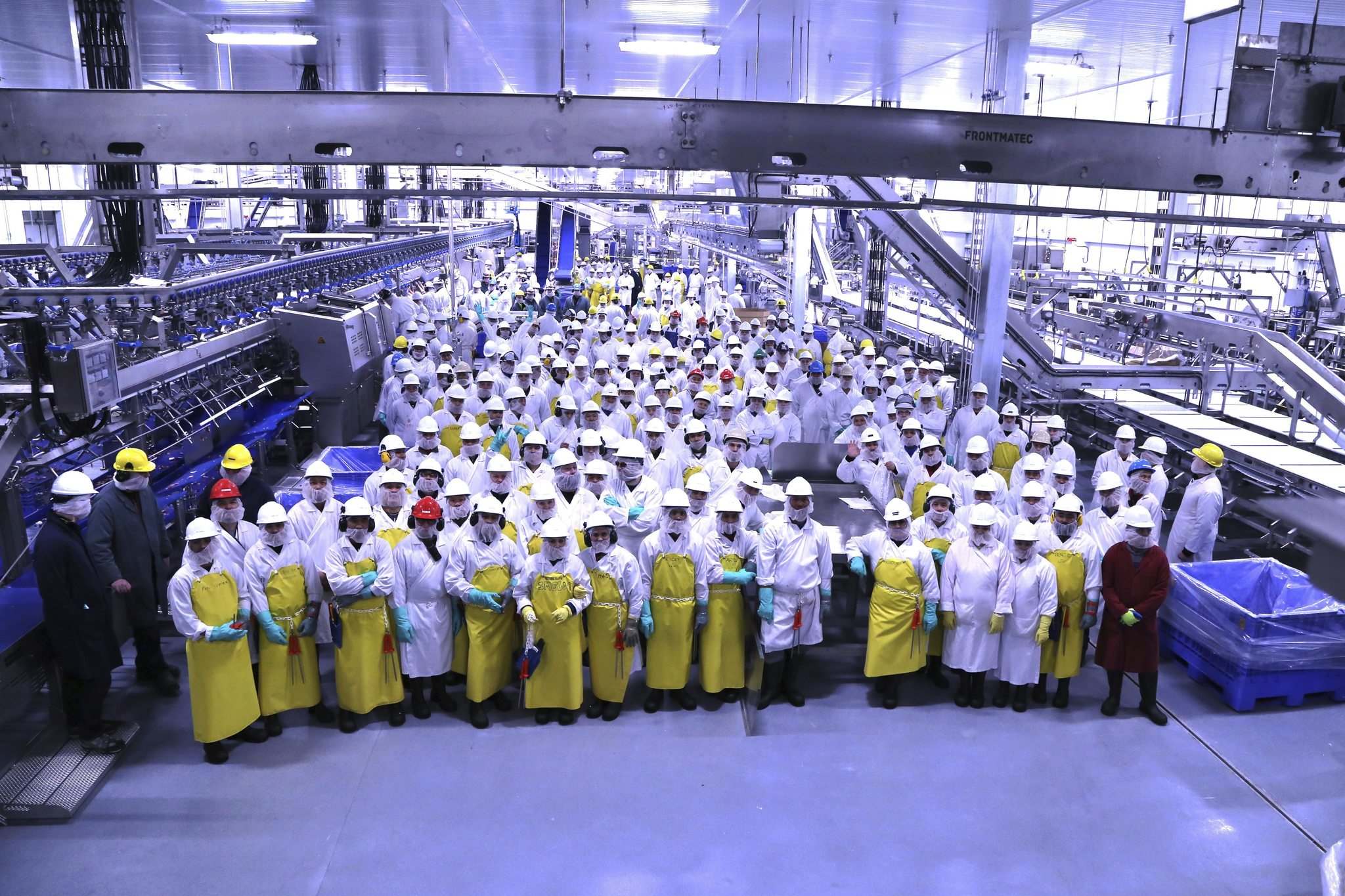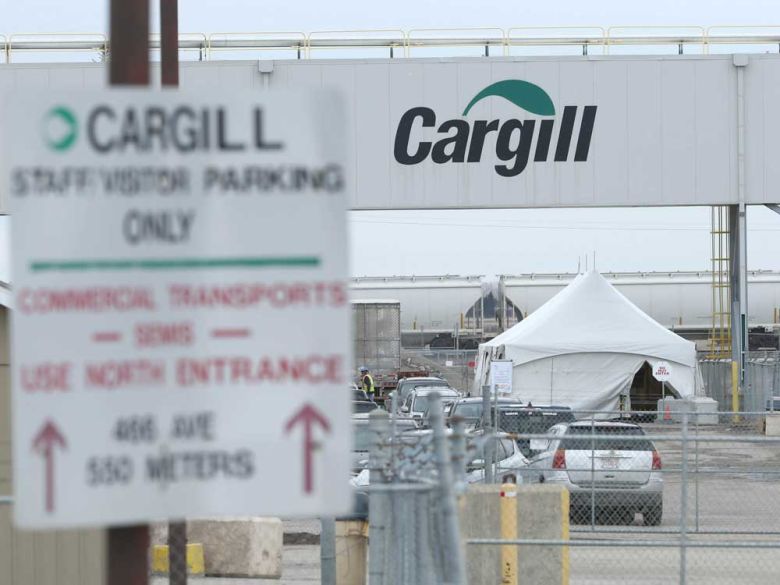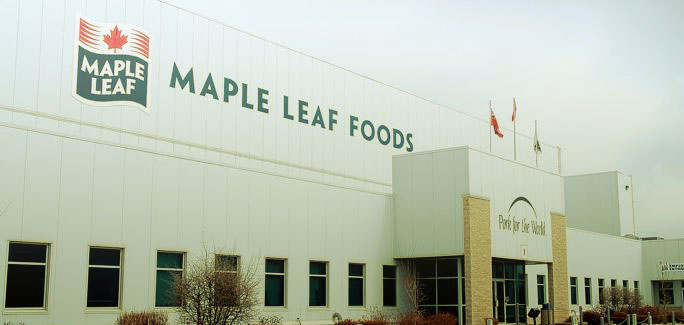The Meat Plants in Canada Affected by the Coronavirus Outbreak

COVID-19 infections are now disrupting parts of Canada’s food sector, including the meat processing industry
by Brooklyn Neustaeter – CTV News.ca
Meat-packing plants in Alberta that are responsible for a substantial portion of Canada’s beef are shut or running reduced lines as they grapple with outbreaks among staff.
The shutdown of these plants and others across the country is causing a ripple effect throughout Canada’s food supply chain, affecting grocery stores and fast-food chains.
“The priority or the preoccupation and challenges we’re facing isn’t as much around safety of the food produced, which continues to be ensured, but the safety of the workers working in those plants because of COVID-19″
Prime Minister Justin Trudeau addressed the shutdown of meat plants in his daily public briefing on Wednesday, saying the federal government’s priority is ensuring those supply chains keep functioning and that its workers feel safe.
“The priority or the preoccupation and challenges we’re facing isn’t as much around safety of the food produced, which continues to be ensured, but the safety of the workers working in those plants because of COVID-19,” Trudeau said. “That is something that requires a little more work and a little more co-ordination to ensure that we’re keeping those workers safe, not just the food safe — which is always a priority for us all.”
Trudeau said the federal government is working “very closely” with the agricultural industry and provinces to ensure that meat plants continue to get food to Canadians while adhering to public health measures.
CTVNews.ca looks at which processing plants are seeing outbreaks and what the companies are doing to ensure Canada maintains a safe supply of meat.
The Cargill plant north of High River, Alberta. (Jim Wells/Postmedia)
CARGILL INCCargill Inc. — one of Alberta’s largest meat processing plants — shut down its plant in High River on April 20 after a 68-year-old woman who worked at the plant died from COVID-19.
As of Tuesday, there are now 759 cases of COVID-19 confirmed among workers at the Cargill plant. It’s the largest outbreak linked to a single site in Canada.
The temporary closure of the facility isn’t expected to result in beef shortages, but the reduction in capacity will mean that ranchers will bear the brunt. As prices for their product fall, ranchers will have to choose between an increase in transportation costs for sending their cattle further for processing, or an increase in overhead because they’re keeping the animals for longer.
The Cargill plant processes about 4,500 head of cattle per day — more than one-third of Canada’s beef-processing capacity.
The company says it plans to reopen the facility on May 4 with one shift of workers. In a statement issued April 29, the company said additional safety measures have been implemented at the facility. Employees returning to the plant are required to have had no symptoms of illness and not had contact with anyone infected with COVID-19 for the past 14 days.
JBS CANADAThe JBS meat-packing plant in Brooks, Alta. has recorded 124 cases as of COVID-19 and one death as of Monday. The plant has reduced operations to one shift a day but remains open.
A petition has been launched calling for a temporary two-week shutdown of the facility to limit the spread of the virus, and for an inspection to ensure public health measures are being upheld.
JBS and Cargill make up 70 per cent of Canada’s beef processing, according to the Canadian Cattlemen’s Association (CCA).
CCA Executive Vice President Dennis Laycraft told CTVNews.ca that the closure of these two plants has already created a backlog of market-ready animals.
“Cargill is one of our largest plants and combined with what’s happening in JBS, that’s basically pushing prices down as cattle are delayed to be sold. And we’ve seen prices since the plant closed dropped by about $500 an animal,” Laycraft said in a telephone interview on Wednesday.
To cope with the backlog, Laycraft said producers are keeping cattle on feed for longer to slow their growth.
CONESTOGA MEATSPork processing plant Conestoga Meats in the Waterloo, Ont. region halted operations April 24 after seven of its employees tested positive for COVID-19. The plant will not be processing hogs for at least 7 days, resulting in limited staffing and operations. The company typically processes between 35,000 to 40,000 hogs a week
The company said in a statement that it is working closely with health officials to ensure prevention, testing, and cleaning protocols are being followed. The Ontario Ministry of Labour is investigating two complaints filed April 22 about a lack of physical distancing procedures at the plant is ongoing.
LILYDALEThe union representing employees at the Lilydale plant in Calgary is calling for the factory’s closure after an employee tested positive for COVID-19.
The employee last worked at the plant on April 15 and is self-isolating at home. Sofina Foods, which owns the plant, says it remains fully operational and has taken a number of steps to protect its workers. However, the United Food and Commercial Workers Canada Union says physical distancing measures at the plant are not being followed and are asking it be closed until proper health protocols are in place.
UNITED POULTRY CO.The United Poultry Co. Ltd. plant in Vancouver temporarily closed on April 20 after 28 workers at the plant tested positive for COVID-19. The outbreak prompted a statement from B.C. Premier John Horgan who said that sick employees must stay home after learning that workers stayed on the job for fear of losing wages.
Vancouver Coastal Health and the Canadian Food Inspection Agency are investigating the outbreak. The health authority said in a news release that the CFIA determined that a recall of chicken products from the plant is not required.
Two cases of COVID-19 were also confirmed at United Poultry Co.’s sister plant Superior Poultry on April 23. An investigation at the plant is underway.
OLYMELQuebec’s Olymel slaughterhouse closed on March 29 after nine cases of COVID-19 were detected among its workforce. More than 100 workers at the facility were later found to have been infected.
The plant has since reopened following an increase in disinfection measures and screening activities issued by the region’s health authorities. The plant’s entire workforce was in self-isolation during the closure and only those who have exhibited no symptoms have returned to work.
Maple Leaf FoodsÕ processing plant in Brandon
MAPLE LEAF FOODSMajor poultry plant Maple Leaf Foods located in Brampton, Ont. suspended operations on April 8 after three people working at the facility tested positive for COVID-19.
The plant has since reopened following a deep cleaning of the plant, including common areas and offices.
An additional COVID-19 case was also confirmed earlier this month at Maple Leaf Foods Heritage plant in Hamilton, Ont. However, the company says the plant remained open as the worker had not been at the plant for two weeks before the diagnosis.
IMPACT FELT ELSEWHEREAs meat plants make changes to production, the impact is starting to be felt in grocery stores across the country with slower operations struggling to meet demand.
Agriculture Minister Marie-Claude Bibeau said in a statement emailed to CTVNews.ca that Canada has enough food amid the COVID-19 pandemic, but consumer might see higher prices and less variety on store shelves. She said the government’s main priority is ensuring the safety of meat plant workers.
“We fully recognize the health concerns of workers all across the agri-food sector. As with all essential workers, proper measures must be put in place if workers in our agricultural sector are going to feed Canadians during these difficult times,” Bibeau said. “Together, we will get through this, and it gives us great pride to see our farmers and food sector workers stepping up in our time of need.”
Laycraft said the sooner meat-packing plants make adjustments to their production lines so employees can safely return to work, the less likely there will be a meat shortage.
“Plants are actually putting in place literally hundreds of changes to ensure there’s a safe workplace,” Laycraft said. “We’re hopeful that we’ll get plants up and running and if we do, then we can avoid shortages. But if they continue to be idle, then then we will start to face shortages.”
Restaurants and fast food chains are also starting to be impacted from Canadian meat plants closing or reducing operations.
McDonald’s Canada says it will start importing beef as Canada’s food supply chain struggles to meet demand amid changes in operations to meat plants amid COVID-19. The restaurant chain, which prides itself on using only Canadian beef, said in a statement released April 28 that it had to change its policy due to limited processing capacity at Canadian suppliers including those at Cargill Inc.
In the United States, President Donald Trump has issued an executive order that meat-processing plants remain open to protect the country’s food supply, despite concerns it puts employees at risk of catching the virus.
At least 15 large plants in the U.S., including major producer JBS USA, Smithfield Foods, and Tyson Foods, among others, have temporarily closed or reduced production due to outbreaks.
Earlier this month Prime Minister Justin Trudeau said beef producers and associations are prioritizing Canadian supply before exports to ensure there are no shortages.
Canada exports about 45 per cent of its beef and cattle production annually, according to the national association, and ships to 56 countries, with the U.S. receiving 74 per cent of beef exports.















